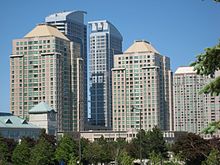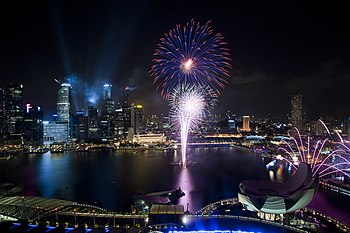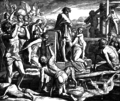
Back درگاه:شهرها Persian Wikipedia:Pooz/Städt KSH Portaal:Steden Dutch Cổng thông tin:Thành phố Vietnamese
The Cities Portal

A city is a human settlement of a notable size. The term "city" has different meanings around the world and in some places the settlement can be very small. Even where the term is limited to larger settlements, there is no universally agreed definition of the lower boundary for their size. In a more narrow sense, a city can be defined as a permanent and densely settled place with administratively defined boundaries whose members work primarily on non-agricultural tasks. Cities generally have extensive systems for housing, transportation, sanitation, utilities, land use, production of goods, and communication. Their density facilitates interaction between people, government organizations, and businesses, sometimes benefiting different parties in the process, such as improving the efficiency of goods and service distribution.
Historically, city dwellers have been a small proportion of humanity overall, but following two centuries of unprecedented and rapid urbanization, more than half of the world population now lives in cities, which has had profound consequences for global sustainability. Present-day cities usually form the core of larger metropolitan areas and urban areas—creating numerous commuters traveling toward city centres for employment, entertainment, and education. However, in a world of intensifying globalization, all cities are to varying degrees also connected globally beyond these regions. This increased influence means that cities also have significant influences on global issues, such as sustainable development, climate change, and global health. Because of these major influences on global issues, the international community has prioritized investment in sustainable cities through Sustainable Development Goal 11. Due to the efficiency of transportation and the smaller land consumption, dense cities hold the potential to have a smaller ecological footprint per inhabitant than more sparsely populated areas. Therefore, compact cities are often referred to as a crucial element in fighting climate change. However, this concentration can also have significant negative consequences, such as forming urban heat islands, concentrating pollution, and stressing water supplies and other resources. (Full article...)
Selected city -
Seoul, officially Seoul Special City, is the capital of the Republic of Korea (ROK), commonly known as South Korea, and the country's most populous urban area. The broader Seoul Capital Area, encompassing Gyeonggi province and Incheon metropolitan city, emerged as the world's fourth largest metropolitan economy in 2014, trailing only Tokyo, New York City, and Los Angeles, hosting more than half of South Korea's population. Although Seoul's population peaked at slightly over 10 million, it has gradually decreased since 2014, standing at approximately 9.97 million residents as of 2020. Seoul is the seat of the South Korean government.
Seoul's history traces back to 18 BC when it was founded by the people of Baekje, one of the Three Kingdoms of Korea. During the Joseon dynasty, Seoul was officially designated as the capital, surrounded by the Fortress Wall of Seoul. In the early 20th century, Seoul was occupied by the Japanese Empire, temporarily renamed "Gyeongseong." The Korean War brought fierce battles, with Seoul changing hands four times and leaving the city mostly in ruins. Nevertheless, the city has since undergone significant reconstruction and rapid urbanization. (Full article...)Did you know -
- ... that WNJU, a Spanish-language television station serving New York City, was the first in the United States to air a hard-liquor advertisement?
- ... that Midwest Scientific was the only maker of microcomputers in Kansas City in the late 1970s?
- ... that Lucy Feagin founded the Feagin School of Dramatic Art in New York City, where talent scouts for radio, screen, and stage were always present to watch her senior students' plays?
- ... that Gloria Rojas, one of the first Latina broadcast journalists in New York City, helped launch the career of Geraldo Rivera?
- ... that Lever House, slated for replacement with a larger building in the 1980s, was protected as a New York City landmark with a one-vote majority?
- ... that 32 former members of the city council of Bogor, Indonesia, were convicted of corruption in 2010, including 3 who were still serving?
Related portals
Related WikiProjects

}
Scarborough (/ˈskɑːrbʌroʊ/; 2021 Census 629,941) is a district of Toronto, Ontario, Canada. It is situated atop the Scarborough Bluffs in the eastern part of the city. Its borders are Victoria Park Avenue to the west, Steeles Avenue and the city of Markham to the north, Rouge River and the city of Pickering to the east, and Lake Ontario to the south. Scarborough was named after the English town of Scarborough, North Yorkshire, inspired by its cliffs. (Full article...)Selected article -

Urban sociology is the sociological study of cities and urban life. One of the field’s oldest sub-disciplines, urban sociology studies and examines the social, historical, political, cultural, economic, and environmental forces that have shaped urban environments. Like most areas of sociology, urban sociologists use statistical analysis, observation, archival research, census data, social theory, interviews, and other methods to study a range of topics, including poverty, racial residential segregation, economic development, migration and demographic trends, gentrification, homelessness, blight and crime, urban decline, and neighborhood changes and revitalization. Urban sociological analysis provides critical insights that shape and guide urban planning and policy-making.
The philosophical foundations of modern urban sociology originate from the work of sociologists such as Karl Marx, Ferdinand Tönnies, Émile Durkheim, Max Weber and Georg Simmel who studied and theorized the economic, social and cultural processes of urbanization and its effects on social alienation, class formation, and the production or destruction of collective and individual identities. (Full article...)General images -
Topics
List articles
Subcategories
Associated Wikimedia
The following Wikimedia Foundation sister projects provide more on this subject:
-
Commons
Free media repository -
Wikibooks
Free textbooks and manuals -
Wikidata
Free knowledge base -
Wikinews
Free-content news -
Wikiquote
Collection of quotations -
Wikisource
Free-content library -
Wikiversity
Free learning tools -
Wiktionary
Dictionary and thesaurus
© MMXXIII Rich X Search. We shall prevail. All rights reserved. Rich X Search







































